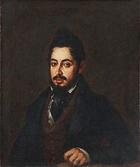
Mariano José de Larra and Sánchez de Castro (Madrid, March 24, 1809-Madrid, February 13, 1837) was a Spanish writer, journalist and politician and one of the most important exponents of Spanish Romanticism. It is considered, together with Espronceda, Bécquer and Rosalía de Castro, the highest level of Spanish literary Romanticism. Journalist, satirical and literary critic, and writer of customs, published in press more than two hundred articles over eight years. He thus promoted the development of the essay genre. Wrote under the pseudonyms Fígaro, Duende, Bachiller and El Pobrecito Hablador. According to Iris M. Zavala, Larra represents "democratic romanticism in action". Far from complacency in the effusions of feeling, Fígaro places Spain at the center of his critical and satirical work. His work has to be understood in the context of the Cortes newly born after the ominous decade (1823-1833), and the first Carlist War (1833-1840). After the suicide of Larra at 27 years old, José Zorrilla read an elegy in his funeral with which he made himself known. The ideas of Larra have their origin in the Spanish Enlightenment, especially in José Cadalso, and were very influential in the later generation of 98. In 1901 some of the representatives of the generation of 98, Azorín, Unamuno and Baroja, have a wreath of flowers to his tomb, a tribute that means his rediscovery and the identification of the group with the thought of Larra and his concern for Spain




